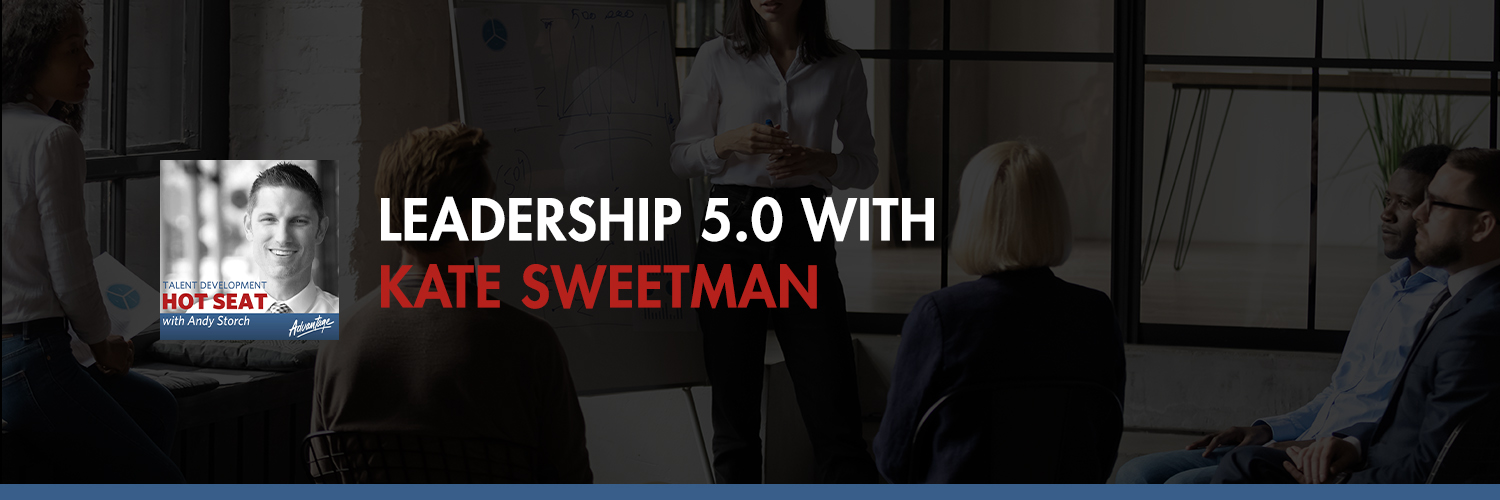
Leadership 5.0
Companies operating within the choices that their leaders make have tremendous impact on the world."
In the Hot Seat: Kate Sweetman on what research reveals for leaders in a new era
What does leadership look like 10 years from now? How do future leaders adapt and react to changing times?
In this episode, Andy Storch interviews Kate Sweetman, the founding principal at SweetmanCragun Group, a global leadership development firm based in London. She is also a dual recipient of a Thinkers50 honor and the co-author of 2 terrific books including The Leadership Code.
Today, she talks about their new research on actions that leaders need to take, and the top barriers to change for businesses and leaders right now. With emphasis on disruption and what she notes as the fourth industrial evolution, Kate explains how companies and leaders should respond as she opens our eyes to the realities of being a leader in this era.

Listen to the podcast here:
Leadership 5.0 with Kate Sweetman
New world leadership and industry disruption preparedness
I'm excited that you're joining me for an interview with my friend, Kate Sweetman. Kate is a two-time recipient of the Thinkers50 honors. Those unfamiliar with Thinkers50, it’s the Academy Awards of business thinking and is based in London. She's the coauthor of 2 terrific books on leadership, the Leadership Code, which has sold over 70,000 copies in 15 languages, and Reinvention: Accelerating Learning in the Age of Disruption, which has been critically acclaimed. The Irish Times called it the best business book ever, which is awesome. She's also authored many articles, been featured in the Harvard Business Review, has taught at Harvard Business School. Most importantly, she's been featured on this show. Kate, welcome to the Talent Development Hot Seat.
I’m delighted to be here. It is a great honor.
Thank you. I should also add you are an American living in London. How long have you been over there?
That's true. We've been here for a couple of years and we're signing up for another couple. Our adventure is extending itself.
You spent some time in Asia as well.
I did. My family and I lived in Kuala Lumpur for three years. I was working for the Central Bank of Malaysia in an interesting capacity. We were doing groundbreaking research on leadership and followership in Asia. At another time, we could talk about that one.
You've done a lot of interesting things in leadership, many different roles internally with companies as well as all the work that you do and have done as a consultant. You've written these two books, which I know is a ton of work. I'm curious, let's start with that, maybe you can fill us in a little bit on your background and how you developed this great passion around the topic of leadership.
Developing a passion for leadership
It's a passion bordering on madness, I guess. I have come to a conclusion, and this is going to be stating the obvious I'm sure to the kinds of readers on this wonderful program, but leadership drives everything. You can have the same business plan, you can have the same organization and when you swap out the leadership, not just at the top, but when you shift the leadership culture, it makes a gigantic difference in the outcomes, in people's experiences and every aspect of the business. I read a statistic a few years back that hit me between the eyes. That has also been driving me quite a bit, which is of the world's 100 largest economies, 52 are corporations.
When you think about the impact that corporations have on not just employees and customers, but the societies that they're operating within, the choices that their leaders make have a tremendous impact on the world. I feel like we're working in an important field. That's what drives me and if we're going to do it, we're going to try to do it as well as we can so it's worth doing the research, the writing, the getting out there and the conversation.
[bctt tweet="What is distinctive about this new era is the convergence of incredible newness around technology and business models." via="no"]
How did you get to this place where you are now? Tell us a little bit about your talent development, leadership development experience that led to you writing these books and doing all the client work that you're doing?
Like a lot of people in this field, I blundered into it. Back in the day, when I started working in this field, which was the early 1990s, leadership, even corporate development of the way that we think about it now was quite new. People talk in terms of management, leadership was quite a new thing. I graduated from business school, and I heard about this cool job. I applied for it, it met my personal needs. It was creative. It was writing intensive. It was classroom work and all these sorts of things. It was idea-driven. It’s all sorts of things I liked. To my mind, it was just an experiment. I went to work for a place called the Center for Executive Development in Harvard Square. I fell in love with it. It's an endlessly fascinating field where, for people like us and I'm sure your readership, you never have the right answer. There's always room to grow, push, move and shape new ideas. That's who I am.
It started the journey that went into all of this?
Yeah, I picked it away from it. I couldn't leave.
I know there's a lot of great content out there and people can go back and take a look at. I want to talk about your new research. I'm curious to learn more about that. What problem are you trying to solve? What are your findings so far?
We're excited about it. When I came back from Malaysia, which was 2014, I took a bit of a sabbatical. I needed to regroup and rethink what I was going to do and what the next phase was. I re-encountered a guy who I'd worked with previously, a guy named Shane Cragun, who's now my partner. He was on a sabbatical at the same time too. I devoted my life to leadership. He does leadership. He also does a lot of change management. He was on a sabbatical going through the same self-examination that I was, which is why is it that the stuff that we're thinking about teaching feels dated? Is it that we're not fresh or is it the material isn’t fresh? Is that the world has changed? We did a lot of work to find out what the best thinking was. We realized that the world had changed. That was 2014, 2015. Here it is, 2020, it’s changed even more. That query embarked us on a quest, and that's why we started doing the research that we did.
Tell us about that because the world is changing all the time. The world has changed, but the world of leadership has changed and it sounds like you're saying it's made a big shift. Tell us about this new world of leadership.
New world of leadership
In fact, we thought maybe we weren't getting it. Because I used to be an editor at Harvard Business Review, I went to my colleagues there and said, “Who's doing the interesting work in terms of reframing leadership?” Not to be a total leadership walk on this call, but back in the early ‘90s, when leadership was just coming onto the scene because of globalization, we had these greats like John Kotter, Ron Heifetz and Jim Collins who were rethinking, what does it mean to be a leader in the era in which we're in? My question was, who's doing that now? Who's reframing how we think about the work that we do and how we need to lead people and where people need to go?
What I was told, and I believe it is that work hadn't been happening for whatever reason. That fundamental reframing of how we approach leadership hadn't happened. There were fabulous work going on, product line extensions of all the subcategories like emotional intelligence, teamwork and all that stuff, but not so much this. We said naively, “We'll do that.” We embarked on a study and we said, “If we're going to do this, let's do it.” We set research parameters, we went to 40 different countries, we looked at 40 industries. We talked to different kinds of people, certainly talent development people, heads of HR, CEOs, digital transformation managers and Millennials. The people who are knowledgeable about the new technologies that are coming down the pike.

New World Leadership: Most leaders do not view inspiration as their job.
Change is not new. The world has always been changing. We all know about the VUCA acronym. We all know that there are questions of velocity that have been changing. To our mind, what is distinctive about this new area about this new era? Which some people are calling the Fourth Industrial Revolution is the convergence of all this incredible newness around technology materials, business models, the platform-based business model. All of these things are happening at the same time. It's the leaders throughout the organization who can figure out how to navigate and harness not just the speed and ambiguity and all that, but there's all this convergence to come up with amazing new ideas and solutions that make the difference.
Preparing for disruption in your industry
You and I talked before, and one of the things you've studied are these barriers to change. The world is changing faster than it ever has before. The world of work is changing faster than it's ever had before. It's also never going to be this slow. It's changing all the time, yet there are a lot of people that are businesses that are seemingly resistant to change. What are the top barriers to change for businesses or for leadership?
To help people crystallize in their own minds, whether they have been change-agile or change-dwelling, we had a key question. It’s an acid test question for our research which is the question we started on all our interviews, “If Elon Musk was to target your industry for disruption, would your organization have the leadership skills to survive?” We asked this question all over the world. It was attention-getting and eye-popping for people because over and over again we heard, “No, we would not survive. If someone of that extremity were to come to our insurance industry, our financial services industry, our real estate industry, our pharmaceutical industry, if somebody that radical were to come and that could happen, we would be out of business.” I should say that by way of preamble. The question becomes, why is that? What gets in our way? That's the question that you asked. Above all else, it's what we call blindfolds that we put on ourselves. It's the mentality that does not allow us to see reality clearly, that does not allow us to act on even what we know, because for a number of reasons.
You and I talked about this before. I have done something similar. We run a program with some clients where we posed the question, “What would happen is if Jeff Bezos and Amazon came into your space and decided that they were going to disrupt this industry or this company? Would you be prepared for that? Would you be able to handle that?” There are a few companies that maybe yes, they would be ready but a lot of them, no, because they don't have that innovative culture. They don't have the kind of culture where they think about disruption. A lot of them are complacent. They're thinking, “We've got this figured out. We're too big and slow to make changes. That's never going to happen to me, Amazon's not going to come into our space.” By the way, if you've been paying attention to the last years, there's nothing that Amazon won't consider entering.
The ones that they will most want to enter are the ones that have been asleep at the switch. That's Strategy 101. They're going to come into the places that are not innovating, that are unhappy. Those are the ones that they're going to go after.
We're talking about companies and leaders maybe not being ready for this. Let's make this practical for our readers, most of whom are in talent development, learning and development, leadership development roles or consulting roles of somebody. How can they help equip their leaders, help their organizations or cultures change to become more agile or more open to innovation and preparing for these changes and for disruption?
Research findings
You need to understand where it is you're trying to get to, where you want to go. One of the major findings of our new research, we have five major findings, but probably the core finding that the other findings attached to or serve. This is relevant to the people who are responsible for leadership development and talent development. We've got to move beyond this idea that we're about engaging our workforce, which depending on how you define it, can be a bit of a lukewarm measure. We look not just to the business world, but also to the larger world where great positive changes have happened.
We would say, “You need to recalibrate that effort away from engagement to inspiring a movement,” where what you're doing is getting people excited about what they're doing and the possibilities for positive change that they can't not do. We looked at things like the Ukrainian Revolution. We also looked at clients of ours who had burst through whatever metric they had set for themselves, even in service like a product launch. Because of the level of excitement, enthusiasm, buy-in, ownership and a sense of purpose that they were able to create in their people, unleashed enormous amounts of energy. It’s keeping a high standard for our leaders around the inspiration that they provide for people. I don't know about you, but most leaders don't view that as their job. They don't view inspiration as their job and they have to.
I heard you say companies need to move away from driving engagement and more to inspire a movement. It's not enough to be engaged in your job at work, but it's about that culture or excitement, igniting that movement. That's something that needs to come obviously from leadership, but that talent professionals need to be thinking about that as well.
[bctt tweet="Companies operating within the choices that their leaders make have tremendous impact on the world." via="no"]
They're in a tremendously important position of helping to raise that bar and helping people to understand that is their responsibility. The reason why we say to inspire a movement is that the changes that people are going to be having to go through can be large and rapid. They can demand a lot from people in terms of taking on new skills, new attitudes, new beliefs, new behaviors. Mothers lift the car off their children when they’re sufficiently inspired. In some places, that's what it takes. It's a more extreme emotional place where a lot of people want to live.
To give an example, I was working with a pharmaceutical company and they were doing a product launch. You would think that's a fairly ordinary thing. It's a lot of work. It's complicated but it's the thing that they do over and over. For a variety of reasons, this particular product launch was of great importance. The potential opportunity was larger than normal. For a host of reasons, it was different. The leadership was a man who was experienced in the field. It was an eye medication. He partnered with a woman who was a PR person, but not particularly expert in this dry eye thing.
Lessons and actions great leaders take
They said, “What we're going to do above all else is inspire our people, get them excited about the possibilities that they will blow the doors off the metrics that we've been given.” There were a lot of things that they did that were amazing, but they did some very specific things. One of the things they did was they said, “We hired for attitude. We only wanted people on this project who came predisposed for enthusiasm.” Number two, this is for a product launch team. They brought in inspirational speakers for their product launch team. Number three, they gave them Ritz Carlton training on how to deal with each other like how to speak to each other, how to treat each other well.
Number four, they bounced people who did not have enthusiasm. They were inclusive. The list goes on. They did all these things. In fact, I ended up writing a case about these guys. One of my favorite interviews was I talked to a guy who is the Chief Financial Officer. He was so funny. He said, “Normally, I'm the last person anybody wants to talk to because I'm always the one who says, ‘No, we can't afford something.’ These guys made me part of the team. I was in on every meeting, and I got to meet the doctors. I got to bring my opinion on topics that had nothing to do with finance, but that they just wanted good thinking about. I worked 56 days straight on this project. I couldn't wait to go in every day, because I have never in my life felt so important to something.” When it finally got to the point where they had to say, “How big is the sales force going to be on this thing?” I wasn't saying no to anything that didn't make perfect sense to everybody else. I was saying yes to a lot of things because I understood what was going on. That's one example of a lot of lessons and actions that great leaders take, to get absurd amounts of enthusiasm and inspiration going for the projects that require people to do extraordinary things.
I'm curious, especially as you're involved in this area of disruption and the Fourth Industrial Revolution, how companies and leaders are responding. Are there any big trends you're following in the learning and development space that we haven't talked about so far?
We use every possible method that we can when we're working with clients. In fact, we're working with a client that we bought five different streams going. We're creating their own proprietary case study to launch the right discussions. We've got workshops going. We got coaching going. We're doing some external publishing with them because that's also exciting to them. We're also diving deep into the digital world. Not just MOOC stuff, but we're partnering with a wonderful partner in Silicon Valley to take digital learning to the next level.
The standard or challenge that we've set for ourselves is to be teaching leadership as they do their work. We're looking into what are the cleverest ways that we can fully integrate leadership support, feedback and coaching, while people are actually doing their work. This includes both AI. It involves the latest technologies as well as deep knowledge of content. That's the trend, the holy grail of what a lot of people are looking for these days. We're optimistic that we have the right team and the right technology that we can push that forward.
As we think about talent development professionals, those out there who are working on these things, embracing these trends, trying to help their leaders, what's one more piece of advice you would give to them to help them be more successful in their role?
I read some research, which I can't mention the authors because it's not out there yet. It was fascinating. What it said was that the talent developers, leadership developers, HR people who are being most effective these days are not being shy at all about meeting the human needs of their employee base. It was interesting what they said, which is that oftentimes, and there are a lot of historical reasons for it, HR people and talent development people are more focused on the hard numbers and processes. They are sometimes reluctant to be strong advocates for meeting the human needs of their people. Making sure they feel included and yet the people who do that get the best results. The other interesting thing about this research was that the other members of the senior leadership team want that from them. Folks in these positions can boost their impact by taking on the human side of leadership and talent development even more than they already do.

New World Leadership: Leaders must recalibrate their efforts away from engagement to actually inspiring a movement.
That’s some great, cutting-edge research right there. It’s definitely a way that talent leaders can step up and help themselves in their careers because things are continuing to change. We've got to be able to evolve with it and continue to learn and get better, which includes listening to awesome researchers like you, authors, influencers. Kate, I know you're out there doing a lot of great work. I appreciate you coming on to share some of your latest research. For anybody reading that wants to maybe connect with you, get in touch with you or learn more, where's the best place for them to go or where should they do?
On LinkedIn, Kate Sweetman. That's the best way to do it. I love to connect that way. By the way, thank you. I think that this show is fantastic. Your guests are wonderful. I imagine it's a regular part of the learning experience of a lot of people out there.
Thank you for coming to the show. Have an awesome day.
Thanks.
---
Thank you for reading this episode of the show. I am always grateful for everyone who tunes in, who reads, who subscribes and who have left reviews for our podcast on iTunes. By the way, if you haven't done that yet, it would mean the world to me. Head on over to iTunes. Take one minute, write a quick review. It helps our podcasts grow. I appreciate your support. As my gift to you, I have created a report on the top five trends impacting talent development. If you haven't grabbed that report yet, you can head on over to AdvantagePerformance.com/trends. You can download my report of the top five trends impacting talent development in 2019, as well as sign up for our newsletter to get updates on everything that is going on. Thanks again for tuning in.
- Leadership Code
- Reinvention: Accelerating Learning in the Age of Disruption
- Shane Cragun
- Kate Sweetman – LinkedIn
- iTunes – Talent Development Hot Seat
- Top trends in talenent development
The Talent Development Hot Seat is sponsored by Advantage Performance Group. We help organizations develop great people.
- Leveraging education to create equity in talent mobility with Matthew Daniel from Guild Education - December 26, 2022
- Solving L&D Measurement Mysteries with Kevin M. Yates - December 13, 2022
- How to create a culture of meaningful work with Tim Olaore of Adventis Health - December 6, 2022
